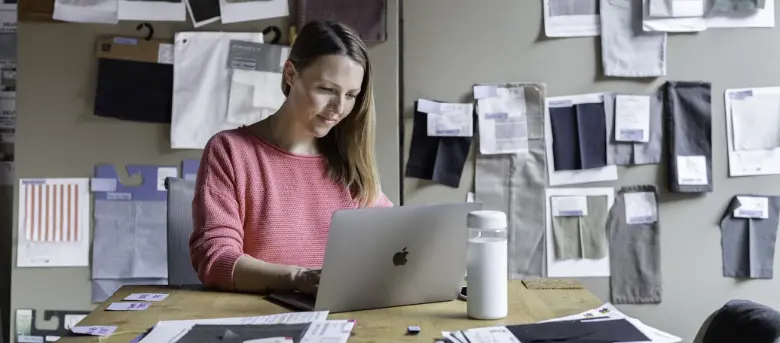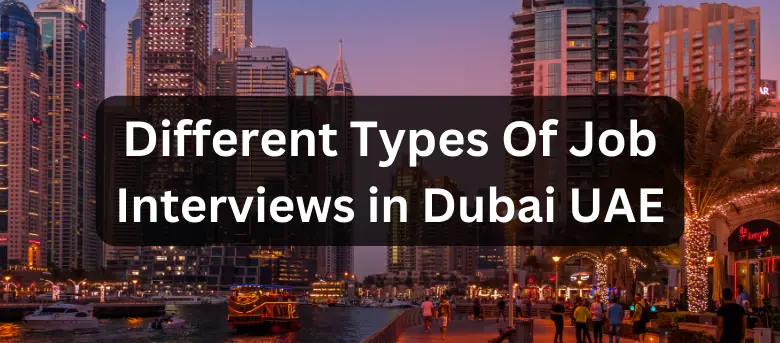Navigating the job interview landscape in Dubai can be daunting, especially in 2024 with its evolving job market dynamics. This comprehensive guide is designed to demystify the interview process, offering insights into various types of interviews, common questions, and preparation strategies specific to the UAE’s unique job environment. Whether you’re a seasoned professional or a newcomer, this article “Different Types Of Job Interviews in Dubai UAE” is an invaluable resource to increase your chances of landing your dream job in Dubai through effective recruitment strategies.
Introduction to the Job Interview Process in Dubai
Dubai, renowned for its impressive skyline and vibrant cultural tapestry, presents an exciting yet challenging arena for job seekers. In 2024, this cosmopolitan city continues to flourish as a global business hub, offering a plethora of opportunities across diverse sectors. To navigate this dynamic job market successfully, it’s essential to understand the unique aspects of the Dubai interview process.
Dubai’s Job Market: A Diverse Spectrum of Opportunities
Dubai’s economy is not just about oil; it’s a diverse landscape encompassing tourism, finance, real estate, technology, and more. This diversity attracts professionals from across the globe, making the job market intensely competitive yet rich with opportunities. Whether you’re a seasoned executive, a tech innovator, or a hospitality expert, Dubai likely has a place for you.
Cultural Diversity and Its Impact on Interviews
One of the hallmarks of Dubai’s job market is its cultural diversity. With expatriates comprising a significant portion of the population, the workforce here is a melting pot of nationalities, languages, and professional practices.
This diversity shapes the interview process in unique ways. For instance, while some companies may lean towards a more formal, Western style of interviewing, others may incorporate aspects reflective of Middle Eastern business culture, such as a stronger emphasis on personal connections and rapport-building.
Adapting to Local Customs
Understanding and respecting local customs and business etiquette is crucial. For example, punctuality is highly regarded, and dressing conservatively for interviews is recommended.
Greetings are often more formal, and it’s important to use titles and surnames unless invited to do otherwise. Small talk can be a significant part of the interview process, reflecting the value placed on personal relationships in business dealings.
The Evolution of Interviewing Techniques
As Dubai continues to evolve, so do its interviewing techniques. Companies are increasingly adopting modern hiring practices, including digital interviewing platforms, AI-based applicant screening, and remote interviews, especially in the wake of the global shift towards digital transformation. This evolution demands that candidates be adaptable, tech-savvy, and prepared for a range of interview formats.
What Types of Interviews Can You Expect in Dubai?

Dubai’s job market is as varied as it is competitive, employing a spectrum of interview styles to assess candidates. Understanding these types can significantly enhance your preparation and performance. Here, we delve into the most common types of interviews you might encounter in Dubai, including structured, situational, walk-in, and behavioural interviews.
Informal Interviews:
Informal interviews are more common in start-ups, creative industries, and some tech companies. These interviews tend to be more conversational and less about checking off a list of questions. They focus on understanding personality, creativity, and potential cultural fit within the organization. This type of interview might take place in a casual setting and can include discussions about various topics outside the standard job-related questions.
Structured Interviews
A structured interview is a standardized way of assessing candidates, where each interviewee is asked the same set of questions. This method ensures fairness and consistency in the hiring process. In Dubai, many organizations, especially in sectors like finance and government, prefer this approach. Expect questions focused on your qualifications, work experience, and skills relevant to the job description. The key to excelling in structured interviews is to provide clear, concise, and relevant answers.
Situational Interviews
Situational interview questions are designed to assess your problem-solving and decision-making skills. These interviews involve hypothetical scenarios related to the job role. For example, a candidate for a marketing position might be asked how they would handle a sudden drop in social media engagement.
In Dubai, where quick thinking and adaptability are highly valued, such interviews are common. Preparing for situational interviews requires you to think on your feet and draw on both your professional experience and theoretical knowledge.
Walk-In Interviews in Dubai
Walk-in interviews are quite popular in Dubai, especially for roles in retail, hospitality, and customer service. These are often unscheduled interviews where candidates can show up at a designated place and time without prior appointments.
The spontaneity of walk-in interviews tests your ability to present yourself professionally without much preparation. It’s an opportunity to make a great first impression, showcase your communication skills, and demonstrate your interest in the role.
Behavioural Interviews
Behavioural interviews are based on the premise that past behaviour is the best predictor of future performance. Employers use this style in Dubai’s dynamic job market to understand how candidates have handled situations in their previous roles.
Questions often start with “Tell me about a time when…” or “Give me an example of…” To prepare, use the STAR method (Situation, Task, Action, Result) to structure your responses, providing specific examples that highlight your skills and achievements.
Other Types of Interviews
Aside from these common types, Dubai’s job market may also feature other interview styles:
- Technical Interviews: Especially in the IT and engineering sectors, where specific technical expertise is evaluated.
- Panel Interviews: Where you are interviewed by multiple members of the organization simultaneously.
- Video Interviews: Increasingly popular, especially in initial screening stages or when candidates are abroad.
- Group Interviews: Several candidates are interviewed simultaneously. This format is often used to assess teamwork and communication skills, especially for roles that involve significant team interaction.
- Stress Interviews: Rare but still present, particularly in high-pressure jobs. These interviews test how candidates handle stress by putting them under pressure or in uncomfortable situations.
Understanding these different types of interviews can help candidates in Dubai prepare more effectively, showcasing their skills and attributes in a way that aligns with the specific demands of each interview style.
Different Rounds of Dubai Job Interviews

In Dubai’s competitive job market, the interview process can be extensive, involving multiple rounds, each designed to assess different aspects of an individual’s suitability for the role. Understanding these rounds can help candidates prepare adequately.
Here’s an overview of the different rounds of interviews you might encounter in Dubai:
Initial Screening Round:
- Purpose: To shortlist candidates from a larger pool.
- Format: Often conducted via phone or video call.
- Focus: Basic qualification check, salary expectations, availability, and a brief discussion about the experience.
Technical or Skill Assessment Round:
- Purpose: To evaluate technical abilities or specific skills required for the job.
- Format: This could involve practical tasks, technical problem-solving, or specific skill tests.
- Industries: Common in IT, engineering, finance, and other roles requiring specialized skills.
First Face-to-Face Interview:
- Purpose: A more in-depth assessment of the candidate.
- Format: Often with a direct supervisor or manager. Can be structured or unstructured.
- Focus: Detailed discussion on experience, skills, career goals, and job specifics.
Behavioural Interview:
- Purpose: To understand personality, values, and how the individual handles work situations.
- Format: In-person or video call, often using the STAR (Situation, Task, Action, Result) format.
- Common in: Various industries, especially where team fit and company culture are important.
Panel Interview:
- Purpose: To get multiple perspectives on the candidate’s fit for the role.
- Format: The candidate is interviewed by several people at once, often from different departments.
- Typical in: Larger organizations or for higher-level positions.
Final Interview with Senior Management:
- Purpose: Final approval from higher management.
- Format: This can be a formal interview or a more casual meeting.
- Focus: Aligning candidate’s vision and values with the company’s goals, and evaluating their potential for growth and leadership.
HR Interview:
- Purpose: To discuss contract details, salary, benefits, and other logistical aspects.
- Format: Typically the final round, is handled by HR personnel.
- Focus: Formal job offer, salary negotiation, start dates, and company policies.
Culture Fit Interview:
- Purpose: To ensure the candidate’s compatibility with the company culture.
- Format: This can be an informal discussion.
- Focus: Understanding the work style, motivations, and how the individual aligns with the company’s values and work environment
Each of these rounds serves a distinct purpose in the hiring process, and it’s not uncommon for candidates to go through multiple rounds before receiving a job offer. Preparation for each round should be tailored to its specific focus, ensuring you present the most relevant aspects of your skills, experience, and personality.
How to Prepare for Common Interview Questions in Dubai?

Preparing for job interview questions in Dubai involves a blend of understanding the local job and the company, aligning your skills and experiences with the employer’s needs, and being culturally aware. Given the diverse business landscape of Dubai, which ranges from start-ups to multinational corporations, tailoring your preparation is key.
Research the Job Market and Specific Industry Trends
Understanding the Dubai Job Scene: Stay informed about the current trends and requirements in your field during your job search in Dubai. For instance, in sectors like technology, finance, or tourism, knowing the current market dynamics can provide context to your answers.
Company-Specific Research: Investigate the company’s history, values, mission, recent achievements, and challenges. This will enable you to tailor your answers to demonstrate how you can contribute to their specific goals.
Research your recruiter: Before the interview, research your interviewer’s professional background, role in the company, and any notable achievements using platforms like LinkedIn. This knowledge helps you tailor your responses, align your skills with their expectations, and build rapport. Understanding their perspective can significantly enhance the effectiveness of your interview dialogue. Check out our guide for more tips on leveraging LinkedIn in your job search.
Review Common Interview Questions and Develop Tailored Responses
Competency-Based Questions: Prepare for questions that seek to understand your skills and experience. Reflect on your past roles and think about how your experiences align with the job description for the role in Dubai.
Behavioural Questions: Practice answers to questions about handling work situations, teamwork, problem-solving, and leadership. Use the STAR (Situation, Task, Action, Result) method to structure your responses.
Cultural Fit: Be ready for questions that assess your adaptability to the multicultural and dynamic work environment of Dubai. For more details on this section go through our blog “Common Job Interview Questions and Answers in Dubai UAE“
Familiarize Yourself with Cultural Nuances
Cultural Sensitivity: Understand the cultural norms and business etiquette in Dubai. This includes dressing appropriately for the interview, greeting in a culturally respectful manner, and showing awareness of the UAE’s diverse workplace.
Communication: Effective communication is key. Practice clear, concise responses and be mindful of your body language.
Prepare for Technical or Role-Specific Questions
Industry Knowledge: Stay informed about the latest advancements or regulations in your field, especially if you are in a highly specialized or technical role.
Practical Examples: Be prepared to discuss specific instances where you utilized certain skills or knowledge pertinent to the role you are applying for.
Anticipate Questions About Working in Dubai
Work Permit and Visa Requirements: Understand and be prepared to discuss any visa requirements or work permit processes if you are an expatriate.
Adaptability: You might be asked about your ability to adapt to living and working in Dubai, especially if you are from a different country.
Plan Questions to Ask the Interviewer
Engagement: Prepare insightful questions to ask the interviewer. This shows your interest in the role and the company. Ask about career development opportunities, company culture, or specific projects you might be involved in.
Mock Interviews and Feedback
Practice: Conduct mock interviews with friends or mentors, especially those familiar with the Dubai job market. Seek constructive feedback to improve your delivery and content.
Review and Reflect
Self-Reflection: Reflect on your career goals and how this opportunity aligns with them. Be prepared to articulate your motivation for the role and working in Dubai.
Stay Informed About Local and Global Events
Current Affairs: Being knowledgeable about significant local and global events can be beneficial, especially if they impact the industry you are applying to.
Send a Thank-You Note
Timeliness: Ideally, send a thank-you email within 24 hours of your interview. This shows your appreciation for the opportunity and your eagerness about the role.
Personalization: Tailor the note to reflect your conversation. Mention specific topics you discussed that excited you about the job or how you see yourself contributing to the team.
By preparing comprehensively, understanding the nuances of the Dubai job market, and aligning your skills and experiences with the employer’s needs, you can confidently tackle common interview questions in Dubai. This preparation will not only help you articulate your qualifications and fit for the role but also demonstrate your readiness to be a part of Dubai’s dynamic professional landscape.
Frequently Asked Questions and Answers
What are the 4 best interview practices?
- Thorough Preparation: Research the company, understand the job role and align your skills with the job requirements.
- Understanding Company Culture: Familiarize yourself with the company’s values and work environment to tailor your approach.
- Effective Communication: Practice clear and concise responses, demonstrate active listening, and be mindful of body language.
- Professional Follow-Up: Send a thank-you note post-interview and follow up appropriately to express continued interest and professionalism.
What are the most 5 common types of interviews in Dubai?
The five most common types of interviews are:
- One-on-One Interviews: A traditional format where a candidate meets individually with an interviewer, typically a hiring manager or potential supervisor.
- Panel Interviews: Involves multiple interviewers, often from different departments, interviewing a candidate simultaneously. This allows for diverse perspectives in the evaluation process.
- Phone Interviews: Used as a preliminary screening tool, where an interviewer assesses a candidate over a phone call. This is often used to narrow down the pool of applicants before inviting them for in-person interviews.
- Video Interviews: Conducted remotely through video conferencing tools, especially relevant for remote positions or initial screening in a more interactive format than phone interviews.
- Group Interviews: Multiple candidates are interviewed at the same time. This type of interview is often used to observe how candidates interact with each other and assess their teamwork and leadership skills.
How to prepare for an interview in UAE?
Preparing for an interview in the UAE involves understanding both the professional and cultural aspects of the region. Here’s a guide to help you prepare effectively:
- Company Research: Study the company’s background, values, and its role in the UAE market.
- Industry Insight: Understand current trends and challenges in your industry within the UAE.
- Cultural Awareness: Learn about UAE’s cultural norms and business etiquette, including dress codes and communication styles.
- Practice Interview Questions: Prepare for common and role-specific interview questions, using your experiences and skills relevant to the job.
- Tailor Your Important Documents: Customize your resume and cover letter to align with the job description.
- Effective Communication: Focus on clear, confident verbal and non-verbal communication skills.
- Dress Appropriately: Choose conservative and professional attire for the interview.
- Plan Your Route: Ensure punctuality by planning your journey to the interview location.
- Follow-Up: Send a thank-you note post-interview, expressing gratitude and reiterating your interest.
Conclusion
In summary, mastering job interviews in Dubai involves a deep understanding of various interview types, including structured, walk-in, and behavioural interviews. Interview preparation is key, encompassing thorough research of the organization, understanding the specific job description, and aligning your skills and experience accordingly.
Being aware of the Emirate’s unique cultural and business landscape, including the expectations of hiring managers and human resources, is crucial. Demonstrating effective communication skills, readiness for situational and technical questions, and presenting yourself well in terms of business attire and professionalism are essential.
Whether you are applying for a role in the thriving marketing industry or as a software developer, your ability to navigate these diverse interview scenarios can significantly increase your chances of landing a job. This approach, coupled with a strong focus on talent acquisition and adaptability to the UAE’s dynamic job market, is the pathway to success in Dubai’s competitive job environment


